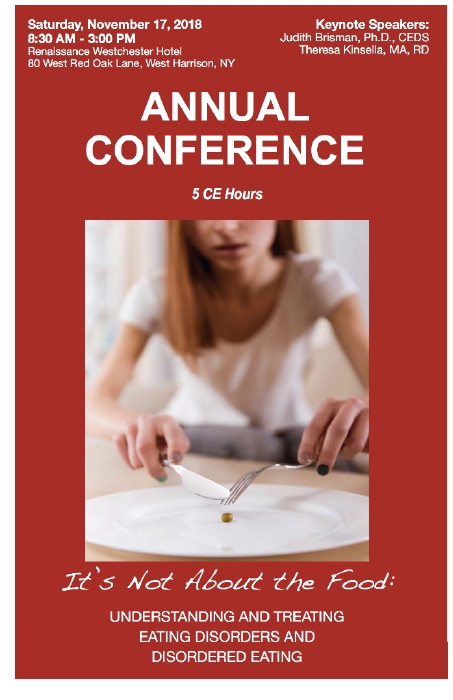
WCSPP ANNUAL CONFERENCE: Understanding and Treating Eating Disorders and Disordered Eating
Continental Breakfast and Check-In (8:30 – 9:00 am)
Morning Program (9:00 am – 12:00 pm): Judith Brisman, Ph.D., CEDS, will describe how the effective treatment of eating disorders often requires a mix of behavioral intervention within a psychoanalytic framework where the “disowned” part of the patient becomes known. A comprehensive definition of various eating disorders, risk factors, treatment issues, the role of the family and transferential/countertransferential considerations will be addressed.
Theresa Kinsella, MS, RD, will describe the essential differences between disordered eating and healthy diet lifestyles, including the clinical strategies useful in responding to our “diet culture.” The assessment and treatment of symptomatic eating behaviors, how to help clients develop a healthy relationship with food, and how to know when a referral to an eating disorder specialist is needed will be presented.
Lunch (12:00 – 1:00 pm) Provided.
Afternoon Program (1:00 – 3:00 pm): Three clinical case vignettes will be presented by Jean Petrucelli, Ph.D., Chaim Bromberg, Ph.D., and Heidi Knoll, LCSW, with a question and answer period to follow.
To download the full brochure, click here.
To register online, please click here.
For more information about our other events and training programs, please visit us at wcspp.org.
Judith Brisman, Ph.D., CEDS is a renowned expert in the field of eating disorders, as well as a sought-after supervisor, speaker and consultant. A founder of the Eating Disorder Resource Center in NYC, she is the author of Surviving an Eating Disorder, as well as a member of the editorial board of Eating Disorders: The Journal of Treatment and Intervention. She is also on faculty at the William Alanson White Institute.
Theresa Kinsella, MS, RD is an esteemed expert on the nutritional aspects of eating disorders, intuitive eating, sports nutrition and bariatric surgery. She currently serves as a consultant to NASA and has previously served on the faculty at Weill-Cornell Medical Center. Ms. Kinsella sees clients in New York City and the Washington, DC metro area.
Jean Petrucelli, Ph.D. is a clinical psychologist and psychoanalyst, supervisor, teaching faculty and Director and Co-founder of the Eating Disorders, Compulsions and Addictions Service at the William Allison White Institute. She is also an Associate Professor at the NYU Post-Doctoral Program, Associate Editor of the journal Contemporary Psychology, and an editor of five books on eating disorders. Dr. Petrucelli has a private practice in New York City.
Chaim Bromberg, Ph.D. is a psychologist and psychoanalyst in private practice in Harrison, NY. He is Co-Director of the LQP program and on teaching faculty at the Manhattan Institute for Psychoanalysis, visiting faculty at WCSPP and the Albert Einstein College of Medicine, and voluntary faculty at Weill-Cornell Medical College.
Heidi Knoll, LCSW is on faculty at WCSPP, voluntary faculty at the Westchester Medical Center and a psychoanalyst and supervisor in private practice in Westchester County, NY.
CONTINUING EDUCATION – 5 CE HOURS
NYS Mental Health Practitioners: Westchester Center for the Study of Psychoanalysis and Psychotherapy is recognized by the New York State Education Department’s State Board for Mental Health Practitioners as an approved provider of Continuing Education for Licensed Clinical Social Workers #0063, Licensed Psychoanalysts #P-0027, Licensed Marriage and Family Therapists #MFT-0040, Licensed Mental Health Counselors #MHC-0075 and Licensed Creative Arts Therapists #CAT-0028.
CT Social Workers: Approval pending from NASW-CT for 5 continuing education contact hours.
Psychologists: WCSPP is co-sponsoring this program with the Westchester Center of Psychological Education (WCPE). WCPE maintains responsibility for the CE program and is approved by APA to offer CE credits for psychologists.
About this conference:
Eating disorders are serious, often complex and potentially life-threatening disorders that affect people of every age, gender, race and socioeconomic group. They often begin with irregular or disordered eating patterns but are treatable when detected early. How, when and in what ways the family intervenes is often vital for successful outcomes. At this conference, we will explore the etiology, signs and symptoms, and treatment of Anorexia Nervosa, Bulimia Nervosa and Binge-Eating Disorders, as well as how the “disowned self” needs to be understood in the treatment. The importance of comprehensive evaluation, medical stabilization, behavioral and familial interventions, and the role of the nutritionist will be elaborated as critical elements in the treatment. Moreover, clinical vignettes will help us understand how to best help children and teens who are struggling with disordered eating or specific eating disorders, as well as the parents of children with an acute or potential eating disorder.
Learning Objectives:
Participants will be able to:
1. Design a behavioral intervention to reduce disordered eating while addressing the psychological reasons for the symptoms;
2. Implement a specific strategy for allowing weight restoration in the anorexic patient;
3. Identify risk factors of eating disorders and symptomatic behaviors that need to be addressed; and
4. Define the concept of dissociation and at least one dimension of the theory related to its use in clinical work with patients with bulimia.
Who should attend: Psychiatrists, psychologists, social workers, mental health and school professionals, nurses, teachers, graduate students.
If requesting CE’s, a completed evaluation must be submitted online through Survey Monkey at the end of the conference.
WCSPP seeks to foster diversity along dimensions of race, ethnicity, gender expression, sexual orientation, age, religion, disability, veteran status, interest, perspectives, and socioeconomic status. Grounded in equal opportunity and non-discrimination, our robust commitment to diversity is fundamental to the Institute’s mission of advancing knowledge, educating future leaders in the field, and providing public service.
